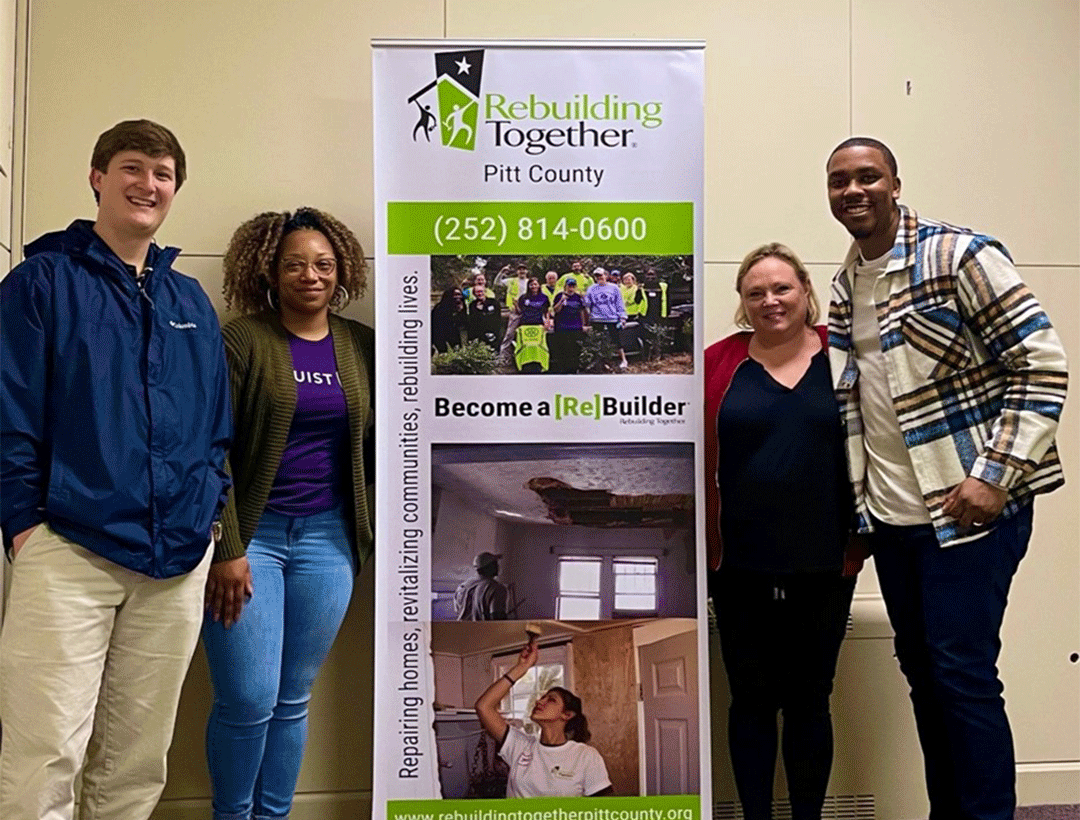Utilizing Occupational Therapy to Reduce Falls in Pitt County
My goal as a future occupational therapy practitioner is to improve the health and well-being of people using meaningful and engaging activities. Occupational therapy is a client-centered profession. We focus on meeting the needs of individuals by providing a unique service that can enhance the performance of an individual’s personal and environmental needs. As a first-year occupational therapy student at Howard University, this work with Rebuilding Together has taught me that flexibility is a major asset on the job. This spring semester, I had the opportunity to collaborate with Rebuilding Together Pitt County to evaluate its housing challenges and provide strategies to further its mission of repairing homes and revitalizing its community.
As a growing affiliate, Rebuilding Together Pitt County provides home repairs, safety upgrades and accessibility modifications to low-income older adults and neighbors with disabilities in the Pitt County area. Pitt County is the fourteenth largest county in North Carolina. It has a population size of approximately 180,000 people and is home to one of the fastest-growing cities in North Carolina--Greenville. Rebuilding Together Pitt County serves throughout Pitt County, which consists of the cities of Greenville, Farmville, Winterville, Ayden and will soon be expanding into Snow Hill.
Unintentional falls are one of the major issues facing the Pitt County community. Since 2016, falls have been the leading cause of injury hospitalizations and emergency department visits. Unintentional falls are affecting many of the older population over 65 in the Pitt County area. Tracy Chavez, the executive director of Rebuilding Together Pitt County, and the Board have been working diligently in the community to prevent the number of accidental falls for homeowners in the Pitt County area. Over this past year, Mrs. Chavez and the Rebuilding Together Pitt County Board have performed 19 projects which consist of new roofs, side rails, grab bars and other home modifications. This following year they are planning to increase the number and are working with local nonprofits in the area to maximize their effort.
My experience at Howard University has prepared me for my journey with Rebuilding Together. During the fall semester, I had the opportunity to collaborate with the DC Department of Aging in Place by speaking at a local church in Southeast DC regarding fall awareness. The ability to collaborate and work in a team setting was essential in making a powerful impact and birthing effective change for community members who experienced falls. It was moving to hear about their experience with accidental falls. They shared how the impact of their fall has caused a financial, emotional and social burden. The team and I engaged in meaningful topics on ways to prevent falls which included fall assessments, compensatory strategies for members with vision loss and home modifications. This volunteer experience drove me to seek similar experiences in the field.
I want to formally thank Tracy Chavez and the Board at Rebuilding Together Pitt County for setting aside time each week to discuss their plans to impact the Pitt County community. I have learned that Pitt County is a growing county with plans to expand in the sectors of community development, bioengineering and medicine. It was my first time experiencing a rural area outside of an urban city community. The food was amazing, and B’s BBQ will forever be my favorite BBQ place. I enjoyed my afternoon lunch meeting with Elaine Anderson (President of the Board) and Tracy Chavez when I visited for the week. Each of the board members has a wealth of knowledge and experience and I hope Rebuilding Together Pitt County continues to grow and excel.
Rebuilding Together's Howard University Fellowship program was made possible through a Rural Capacity Building grant from the Department of Housing and Urban Development (HUD). We are thankful for HUD's commitment to affordable housing and community development activities in rural areas.